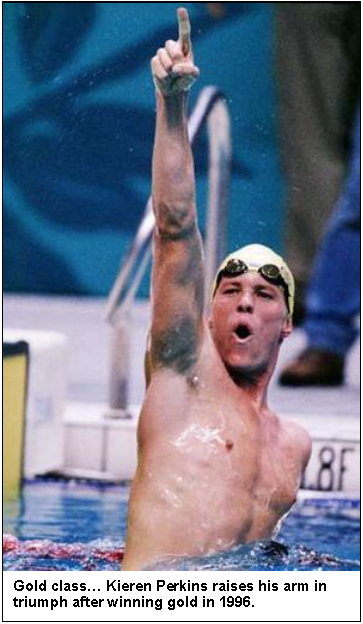Ten years ago today, Kieren Perkins stole the show in Atlanta. Here, he recalls a day to remember - not only for himself, but a nation.
TEN years ago I was laying face up on a massage table overcome by a wave of nerves and fear. Despite feeling ready the day before in the heats, I'd swum a complete shocker and scraped into the Olympic men's 1500m final, literally by a fingernail.
As the physio dug into my sore muscles, I mentally went to work on my bruised confidence. To this day I can't explain the heat swim. It wasn't like some claim - a clever ploy to place myself away from the main competition in the middle of the pool. Believe me, there is no athlete that good. It was simply a "bad swim", not uncommon for me first-up in competition.
But now I had to face the present - a chance to silence the critics and continue my quest to be the first man to perform a three-peat in Olympic swimming (Perkins ended up coming second to Grant Hackett in Sydney). Four years had passed since I won my first Olympic gold in Barcelona and since standing on the dais in Spain, I'd broken world records and collected a swag of Commonwealth, World Championship and Pan Pacific medals.
In 1994, I was awarded FINA's Most Outstanding Male Athlete of the Quadrennium and continued to train hard, but charity and business commitments required time away from the pool. My body was older and took longer to recover not just from training but injury, too. I had started weights training and cycling to the pool. In short, life got busy but I kept churning out the laps.
All champions believe they will win, and I always thought I would win in Atlanta. Even when illness struck and I struggled at the Olympic trials, I still knew I could win. Longevity is the greatest test of any athlete, simply because if you do the work and have the talent, winning the first time around is easy. Maintaining the desire and hunger to keep up the workload makes winning over a long period a greater challenge. Life gets in the way and tempts you away from your main focus - the pool.
Now on the massage table, only hours away from my second Olympic 1500m final, my mind was playing tricks on me, and the pressure, both personal and from the media, was pushing me into the panic zone - a place I couldn't afford to be.
On this day of reckoning, the moment of panic, albeit brief, was intense, and my whole life flashed through my head in a series of disjointed images and newspaper headlines: "Perkins flounders in Lane Eight"; my coach John Carew; and his last words of advice, "you've done the work and know what you have to do, forget about everything else".
Good thoughts and bad thoughts hijacked my thinking. I can't let everyone down - myself, my coach, my wife, Sam, my family, the country. If I bomb out again, customs won't let me back into the country for losing. The ludicrous irrationality of the last idea jolted me back to reality.
Forsaking worry, I now felt anger. Angry with myself for letting my mind wander, however briefly, from the task at hand, to do my best and win. Champions cannot afford doubt. I told myself to refocus, thanked my physio and leapt off the table with purpose. At that very moment I knew I would win my second Olympic gold.
In the marshalling area I listened to music to pump myself up and stifle my surroundings. I thought about the race and how I had to swim to win - go out hard and go out fast. Illness had disrupted my preparation for the '96 Olympics and meant Dan Kowalski, my fellow Australian competitor, had a physical edge over me, so I had to dominate early or risk his swimming on my shoulder and overcoming me in the final laps. I needed to be clear of the field after the first 100m, that I was sure of.
When I watch replays of the race I can see the determination on my face and my unbridled joy. My emotional response to that victory still surprises me 10 years on. But the unrelenting media scrutiny myself and my wife copped in the race lead-up made that win so much sweeter. More surprising is the response of the public. I am still stunned when people tell me where they were and what they were doing when I won in Atlanta.
The grandstand kiss has become a romance benchmark in my marriage I've seldom been able to replicate except with the births of our three children. Otherwise, in 2006, I find myself happy and life fulfilled, retired from competition but not from sport. I always intended to give back to swimming - a sport that rendered me valuable life lessons and many priceless opportunities.
As a board member of the Australian Sports Commission and Swimming Australia, I hope to lend my experience to the future generations of Australian athletes. Sport is important for all of us, especially our children. The spiralling child obesity statistics alarm me greatly, and as a father and Olympian I can inspire Aussie kids to enjoy physical activity.
Medals and records are fantastic but sharing your knowledge to improve the lives of others is definitely the greater reward.
